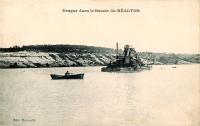Show search results for
Airbus A300B and the Rise of Mass Tourism
The volume of air traffic increased drastically over the past 50 years as a result of globalization and mass tourism and has a significant impact on climate change.
Pollution and Industrialization of the Neva and Viennese Danube in the Nineteenth and Early Twentieth Centuries | Neva and Danube Rivers
In this chapter of their virtual exhibition “‘Commanding, Sovereign Stream’: The Neva and the Viennese Danube in the History of Imperial Metropolitan Centers,” the authors discuss similarities and differences in the history of water supply, pollution, and waste management in St. Petersburg and Vienna.
The Ecological Sustainability of Local Food Systems
Although simply reducing food miles does not guarantee a more sustainable diet, choosing to participate in alternative local food systems instead of the conventional food system is a sure way to increase your access to environmentally friendly food and to support more ecologically sustainable agricultural practices.
Corridors, Concessions, and the Extraction of Natural Resources in Liberia
This article is a critique of the “open door” development policy promoted by the Liberian government after World War II, and shows the environmental and social impact of state reliance on foreign direct investment.
Sprawling from Grace
This film criticizes America’s suburban sprawl and its dependence on oil as being unsustainable for the future.
Lions, Lords, and Automobiles: Animal Entertainment and Travel Technologies in the Late Twentieth Century
Automobiles fundamentally shifted the ways in which visitors to animal attractions experienced the creatures on display before their eyes.
An Endless Sediment Story: The First Five Decades of the Canal de Marseille
The Canal de Marseille has allowed an improvement in the water supply in the city of Marseille, but also induced environmental issues in its first decades due to strong suspended sediment fluxes.
American Horses for the South African War, 1899–1902
American equines shipped to the South African War suffered conditions like those on slave ships in the transatlantic slave trade.
Rivers, Memory, and Nation-Building: A History of the Volga and Mississippi Rivers
Beginning in the pre-modern world, the Volga and Mississippi Rivers both served as critical trade routes connecting cultures in an extensive exchange network, while also sustaining populations through their surrounding wetlands and bottomlands. In modern times, “Mother Volga” and the “Father of Waters” became integral parts of national identity, contributing to a sense of Russian and American exceptionalism. Rivers, Memory, and Nation-Building discusses their histories, through which we derive a more nuanced view of human interaction with the environment, which adds another lens to our understanding of the past.










